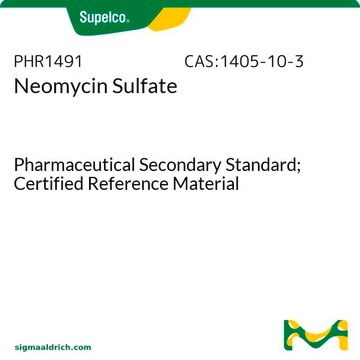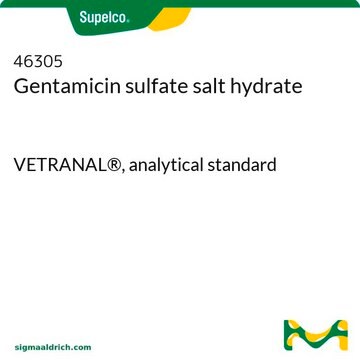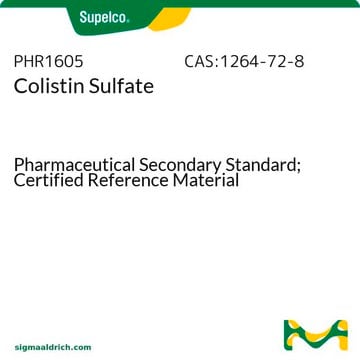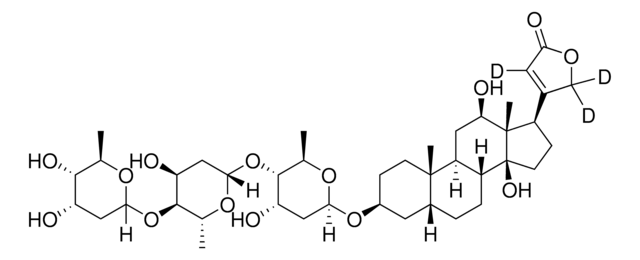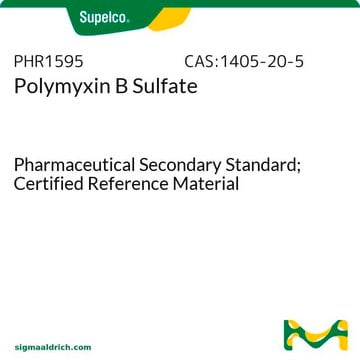PHR1077
Gentamicin Sulfate
Pharmaceutical Secondary Standard; Certified Reference Material
Synonym(s):
Gentamicin sulfate salt
About This Item
Recommended Products
grade
certified reference material
pharmaceutical secondary standard
Quality Level
Agency
traceable to BP 174
traceable to Ph. Eur. G0200000
traceable to USP 1289003
API family
gentamicin
CofA
current certificate can be downloaded
technique(s)
HPLC: suitable
gas chromatography (GC): suitable
application(s)
pharmaceutical (small molecule)
format
neat
storage temp.
-10 to -25°C
SMILES string
O=S(O)(O)=O.O[C@]1(C)[C@@H]([C@@H](O)[C@@H](O[C@@H]2[C@@H](O)[C@H](O[C@H]3O[C@@](CC[C@H]3N)([C@@H](C)NC)[H])[C@@H](N)C[C@H]2N)OC1)NC.O[C@]4(C)[C@@H]([C@@H](O)[C@@H](O[C@@H]5[C@@H](O)[C@H](O[C@H]6O[C@@](CC[C@H]6N)([C@@H](C)N)[H])[C@@H](N)C[C@H]5N)OC4)NC.O[
InChI
1S/C21H43N5O7.C20H41N5O7.C19H39N5O7.H2O4S/c1-9(25-3)13-6-5-10(22)19(31-13)32-16-11(23)7-12(24)17(14(16)27)33-20-15(28)18(26-4)21(2,29)8-30-20;1-8(21)12-5-4-9(22)18(30-12)31-15-10(23)6-11(24)16(13(15)26)32-19-14(27)17(25-3)20(2,28)7-29-19;1-19(27)7-28-18(13(26)16(19)24-2)31-15-11(23)5-10(22)14(12(15)25)30-17-9(21)4-3-8(6-20)29-17;1-5(2,3)4/h9-20,25-29H,5-8,22-24H2,1-4H3;8-19,25-28H,4-7,21-24H2,1-3H3;8-18,24-27H,3-7,20-23H2,1-2H3;(H2,1,2,3,4)/t9-,10-,11+,12-,13+,14+,15-,16-,17+,18-,19-,20-,21+;8-,9-,10+,11-,12+,13+,14-,15-,16+,17-,18-,19-,20+;8-,9+,10-,11+,12-,13+,14+,15-,16+,17+,18+,19-;/m110./s1
InChI key
RDEIXVOBVLKYNT-HDZPSJEVSA-N
Looking for similar products? Visit Product Comparison Guide
General description
This broad-spectrum antibiotic, is widely used as an active pharmaceutical ingredient (API) with therapeutic potential against both Gram-positive and Gram-negative bacteria.Certified pharmaceutical secondary standards for application in quality control provide pharma laboratories and manufacturers with a convenient and cost-effective alternative to in-house working standards.
Application
Biochem/physiol Actions
Antimicrobial spectrum: Includes Gram-negative and Gram-positive bacteria, including strains resistant to tetracycline, chloramphenicol, kanamycin and colistin, particularly strains of Pseudomonas, Proteus, Staphylococcus and Streptococcus.
Caution
Other Notes
Footnote
related product
Signal Word
Warning
Hazard Statements
Precautionary Statements
Hazard Classifications
Skin Sens. 1
Storage Class Code
11 - Combustible Solids
WGK
WGK 2
Flash Point(F)
Not applicable
Flash Point(C)
Not applicable
Choose from one of the most recent versions:
Already Own This Product?
Find documentation for the products that you have recently purchased in the Document Library.
Customers Also Viewed
Our team of scientists has experience in all areas of research including Life Science, Material Science, Chemical Synthesis, Chromatography, Analytical and many others.
Contact Technical Service
